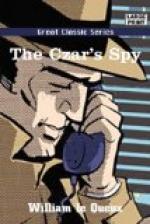With his latter remark I entirely coincided. In my own mind that was the strongest argument in favor of Leithcourt’s innocence. That the tenant of Rannoch had kept that secret tryst in daily patience I knew from my own observations, yet to me it scarcely seemed feasible that he would use a weapon so peculiarly Italian and yet so terribly deadly.
And then when I reflected further, recollecting that the body I had discovered was that of a woman and not a man, I stood staggered and bewildered by the utterly inexplicable enigma.
I promised the burly detective that in exchange for his secrecy regarding my statement that I would assist him in every manner possible in the solution of the problem.
“The real name of the murdered man must be at all costs withheld,” I urged. “It must not appear in the papers, for I feel confident that only by the pretense that he is unknown can we arrive at the truth. If his name is given at the inquiry, then the assassin will certainly know that I have identified him.”
“And what then?”
“Well,” I said with some hesitation, “while I am believed to be in ignorance we shall have opportunity for obtaining the truth.”
“Then you do really suspect?” he said, again looking at me with those cold, blue eyes.
“I know not whom to suspect,” I declared. “It is a mystery why the man who was once my faithful servant should be enticed to that wood and stabbed to the heart.”
“There is no one in the vicinity who knew him?”
“Not to my knowledge.”
“We might obtain his address in London through his father in Leghorn,” suggested the officer.
“I will write to-day if you so desire,” I said readily. “Indeed, I will get my friend the British Consul to go round and see the old man and telegraph the address if he obtains it.”
“Capital!” he declared. “If you will do us this favor we shall be greatly indebted to you. It is fortunate that we have established the victim’s identity—otherwise we might be entirely in the dark. A murdered foreigner is always more or less of a mystery.”
Therefore, then and there, I took a sheet of paper and wrote to my old friend Hutcheson at Leghorn, asking him to make immediate inquiry of Olinto’s father as to his son’s address in London.
I said nothing to the police of that strange adventure of mine over in Lambeth, or of how the man now dead had saved my life. That his enemies were my own he had most distinctly told me, therefore I felt some apprehension that I myself was not safe. Yet in my hip pocket I always carried my revolver—just as I did in Italy—and I rather prided myself on my ability to shoot straight.
We sat for a long time discussing the strange affair. In order to betray no eagerness to get away, I offered the big Highlander a cigar from my case, and we smoked together. The inquiry would be held on the morrow, he told me, but as far as the public was concerned the body would remain as that of some person “unknown.”




